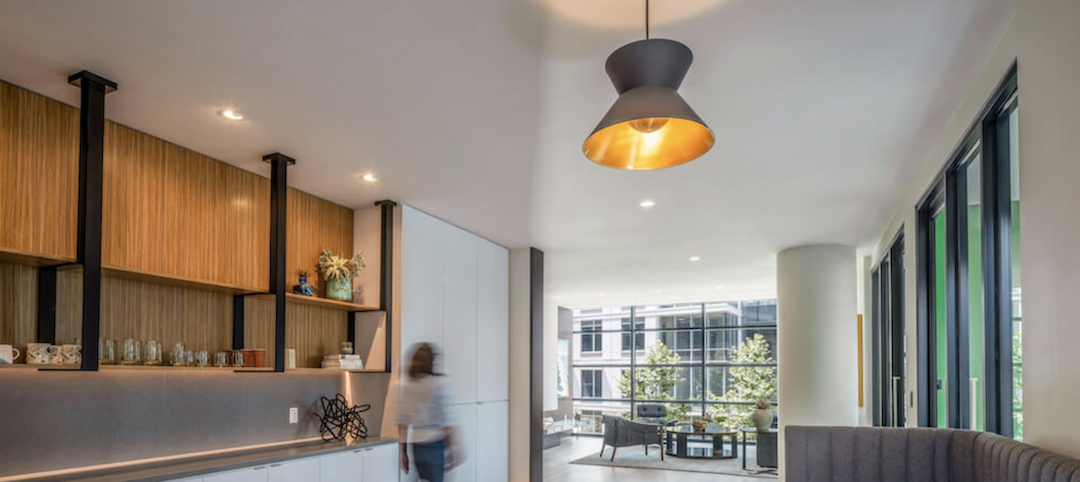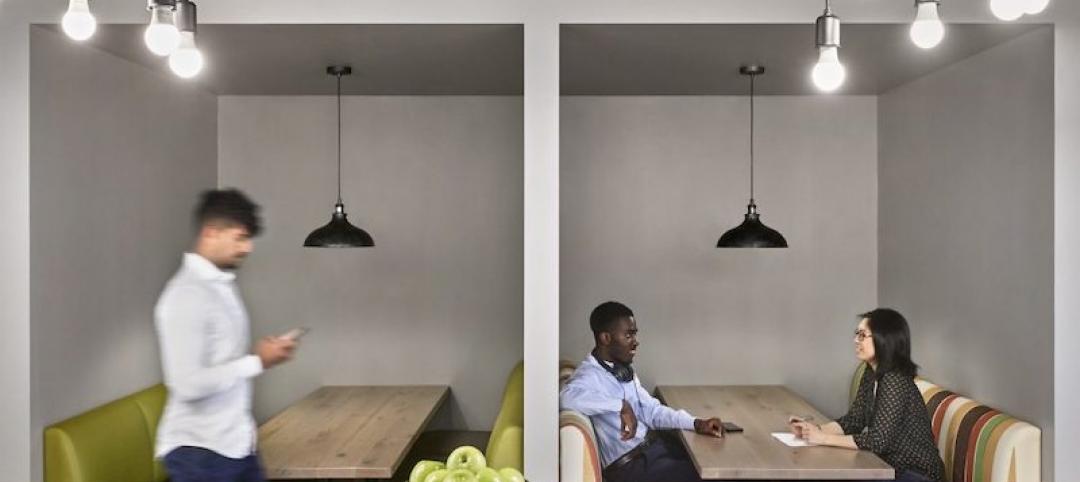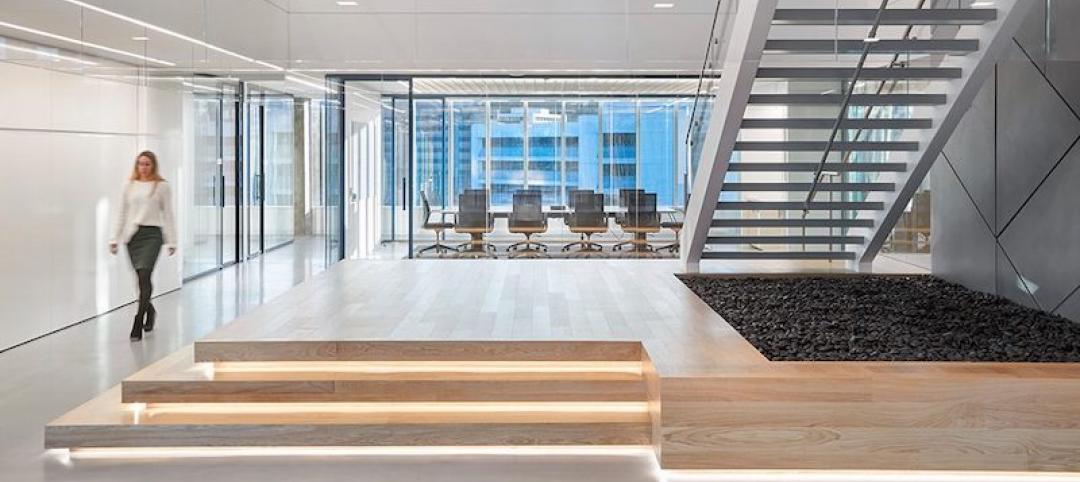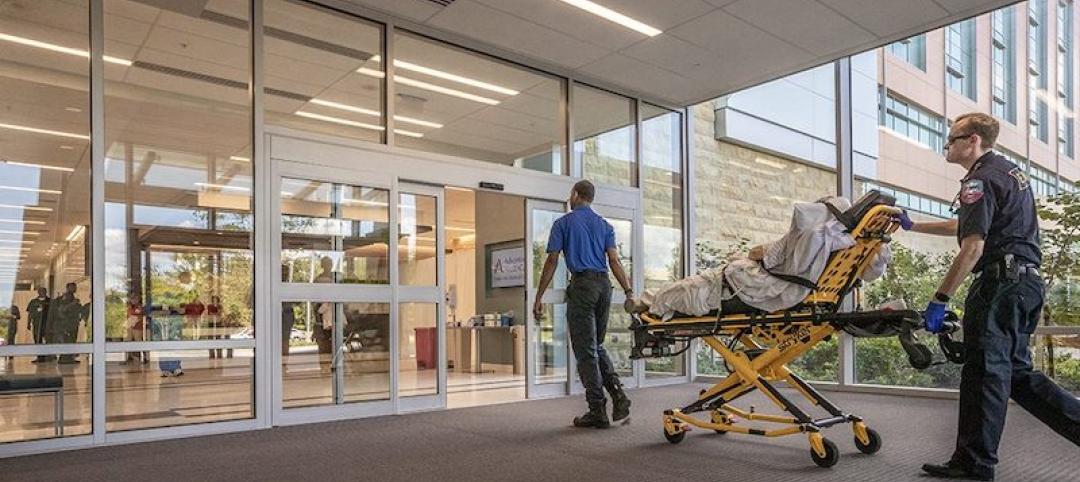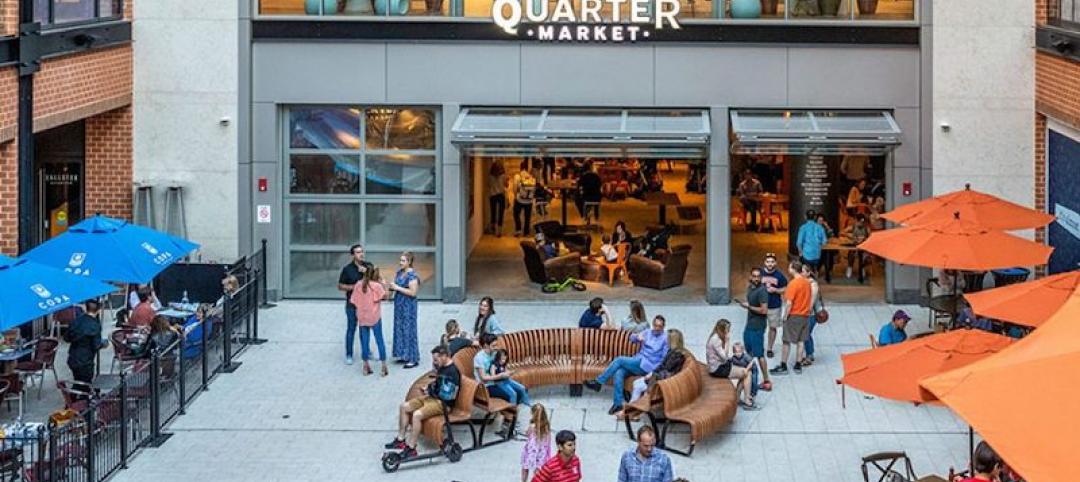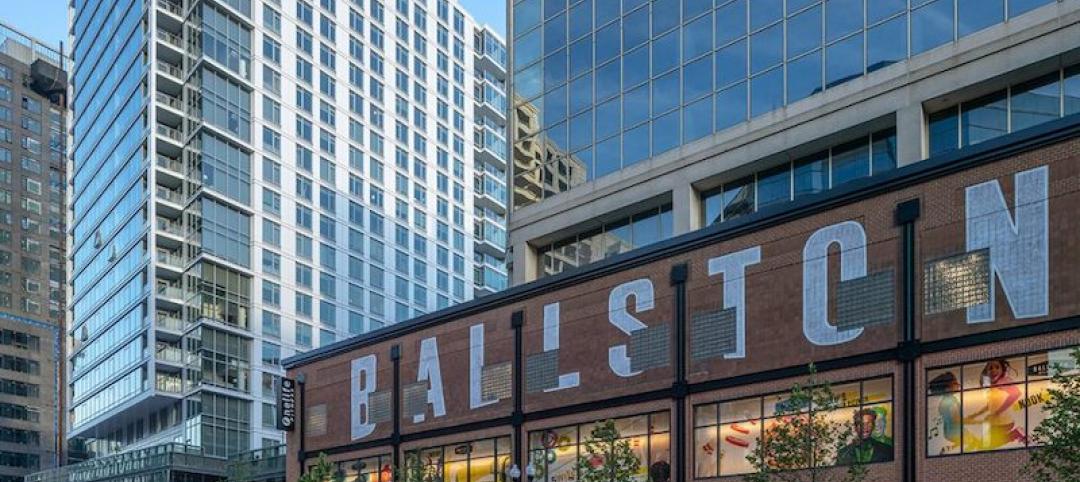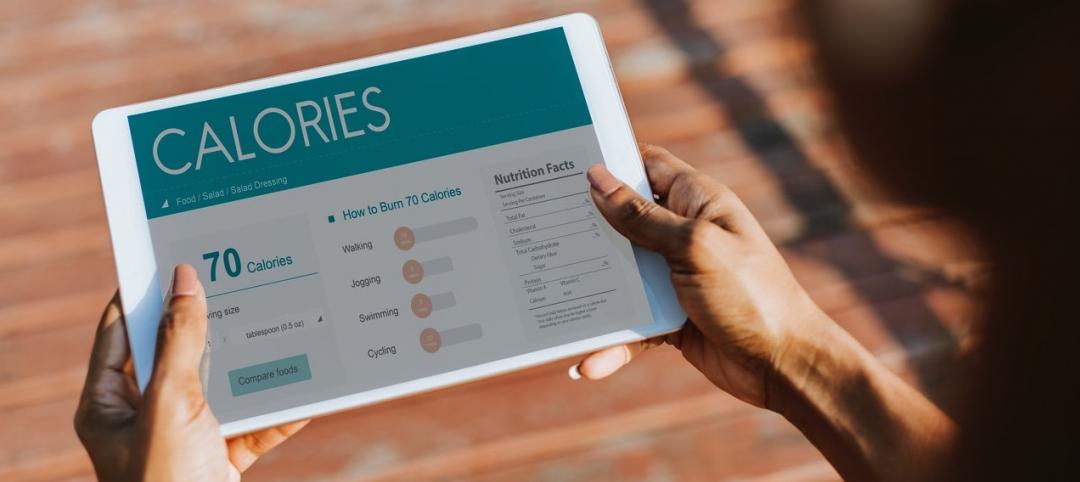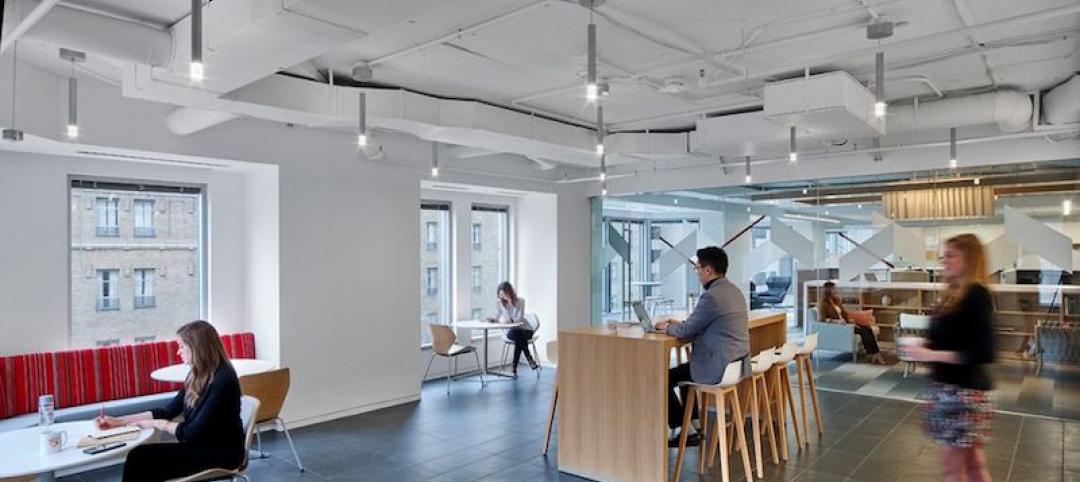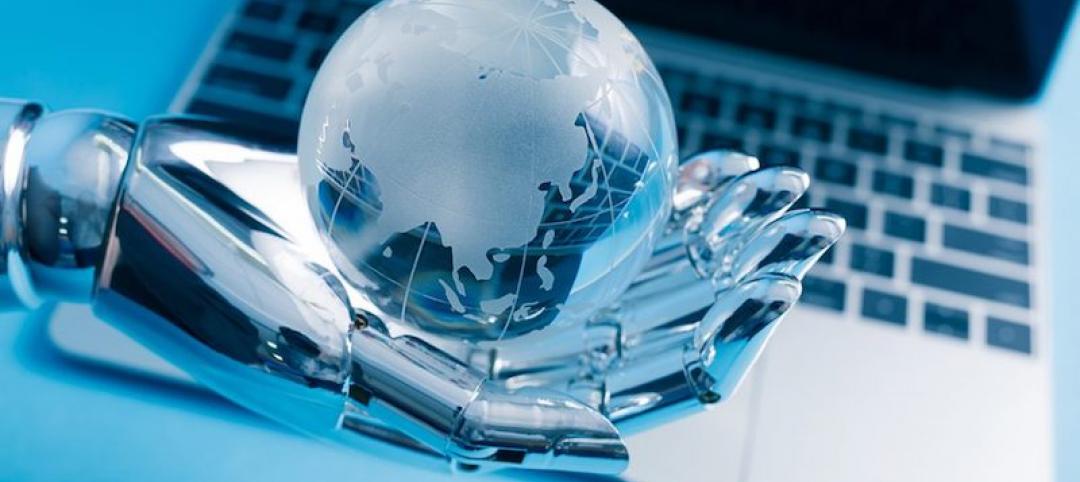It’s no surprise that robots have chosen hotels to invade first—after all, in no other sector or building is service so highly valued and scrutinized. Whether it’s automating the check-in desk, bringing additional toiletries to the room or booking dinner reservations, digitally driven services and technology have altered the guest experience. But are guests ready for even more drastic changes? How much do they value human interaction over touch-of-a-button convenience? CallisonRTKL’s recent survey helps shed some light on how the hotel of the future might strike a balance between tech and the human touch.
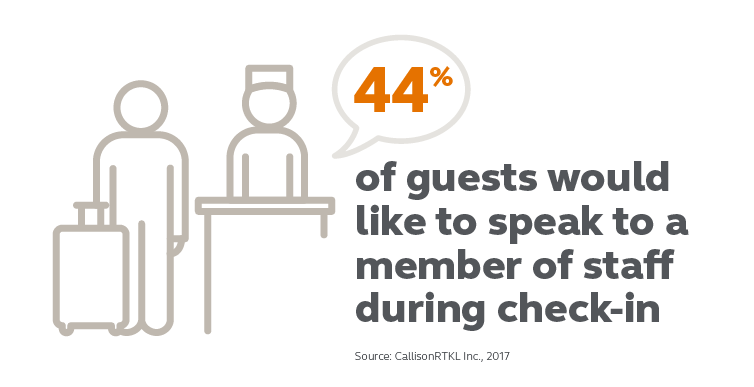
Automation nation
CallisonRTKL recently unveiled the Hotel of the Future, a data- and insight-driven digital report that predicts the future of hospitality design and, specifically, how our hotels will help blend in with the surrounding neighborhood and become an extension of our homes when we’re away. Our follow-up survey of more than 320 travelers provided additional insight into guest preferences when it comes to food, amenities, technology, and more. Among some of the more interesting findings was a ranking of factors, in order of importance, that guests consider when booking a hotel:
- Security/privacy (79%)
- Front desk-check-in (34%)
- In-room technology (32%)
- Bar on-site (22%)
- Hotel app – mobile check-in, concierge (21%)
Additionally, the data show that while guests expect tech-integrated services—particularly when it comes to guest room controls—44% of guests would like to speak to a staff member during check-in, and 60% of us have more than a few hesitations about staying in a hotel entirely operated by robots. So while many hotels have gotten rid of the front desk in favor of mobile apps or kiosks intended to provide a more streamlined, efficient experience, they may want to reconsider just what type of welcome that really extends.
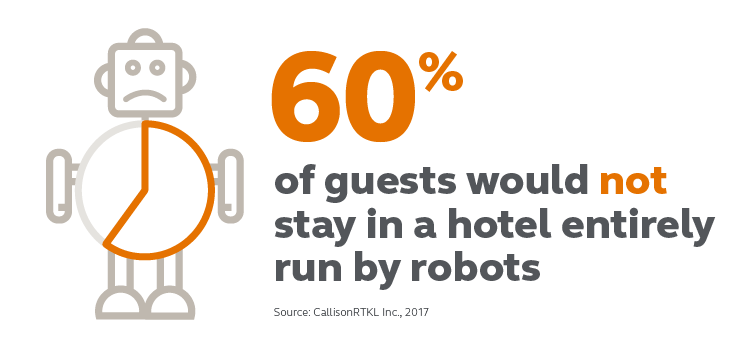
TECH LEVELS
The degree to which hotels have ventured into tech territory varies wildly, and the consensus seems to be that, while many will try, only a few may thrive.
Replacing Humans with Robots
The 100-room Henn na Hotel in Japan claims the spot of the world’s first hotel staffed by robots. Human staff are only deployed in emergency situations. Interesting in theory; however, guests have described interacting with the robots as “very much like talking to Siri’s younger, dumber sibling.” While Henn na Hotel has plans to open 100 more locations, it’s worth keeping in mind that if technology doesn’t work perfectly the first time, people quickly lose interest—no matter how much more “convenient” it purports to be.
Gamification & Real-time Guest Feedback
Marriott International opened “M Beta” at the Charlotte Marriott City Center, a prototype hotel that gathers guest feedback in real-time, enabling staff to immediately address problems or concerns. “Beta buttons” on walls and tables empower guests to weigh in on every aspect of their stay. These tools are key to Marriott’s innovation lab where it tests out new ideas to gear up for the next generation of guests who will soon make up the bulk of the market.
In-Room Tech & Multifunctionality
According to a 2017 study by Cornell University Center for Hospitality Research, 46% of hotel guests in the US travel with the intention of working out, but only 22% of travelers use hotel gyms. Some hoteliers are looking to close the gap by providing in-room workout space and digitally connected equipment for guests interested in maintaining their fitness routine while traveling. Hilton Hotels is among them, having recently debuted its Five Feet to Fitness concept—a collection of rooms offering premium gym equipment, such as indoor cycling bikes and functional training stations with weights, suspension ropes and pull-up bars. Each station includes a touchscreen display with video tutorials on how to safely use the equipment and a selection of workout videos.
PROGRAMMING THE PERFECT MIX
So, how does a hotel take advantage of all the cool tech tools out there without risking an impersonal or glitch-y guest experience? Here are a few pieces of advice:
1. All Ages Welcome - If the market is a mix of ages and demographics, it’s important to make sure any technology offered is user-friendly for every generation. Consider that mobile check-in or robot concierges may be easier for the younger digital native generation to adapt to, and don’t discount more senior guests who may not want their experience to be digitally driven.
2. Customer Service First
3. It’s not about replacing humans with robots; rather, it’s identifying those areas where technology can greatly improve the guest experience and minimize disruptions. If the technology is overly complicated or requires too much troubleshooting, then guests will still expect a human to assist. One should supplement, not replace, the other.
4. Real talk: we know that integrating or upgrading technology in hotels is costly. It’s vital that brands and developers optimize their square footage to find opportunities for additional revenue streams that can support necessary investment. Some hotels, for example, are decreasing the size of their kitchens or eliminating them altogether, alleviating the burden of providing all-day meal service and support staff. Instead, partnerships with local restaurants and star chefs offer opportunities to inject local flavor—literally—into the hotel’s dining space, freeing the hotel from offering costly, and underutilized, food and beverage services. Because in the hotel of the future, guests will have access to everything they might need without being charged for the things that they don’t.
5. Reduce Extras, Maximize Revenue
More from Author
CallisonRTKL | Dec 20, 2021
Digital nomads are influencing design
As our spaces continue to adapt to our future needs, we’ll likely see more collaborative, communal zones where people can relax, shop, and work.
CallisonRTKL | Jun 30, 2020
The great reset and our new work life
As many countries begin to return to the office, it’s a chance to ask ourselves: what do we truly value?
CallisonRTKL | May 4, 2020
How working from home is influencing design
The lessons learned in the next few months can help shape how we work and design in the future. For now, remote work is different – and our new normal.
CallisonRTKL | Feb 26, 2020
Sustainability in a material world
The concepts of embodied carbon, zero waste, and deconstruction and reuse often run on parallel tracks.
CallisonRTKL | Jan 30, 2020
The complex dance of healthcare transitioning
Hospital employees, though excited about technological advancements, are expected to navigate a new workplace and care for their patients at the same time, all while training on new equipment and navigating a new building.
CallisonRTKL | Jan 6, 2020
Retail re-invention: Five questions to ask
Why have some malls survived their long-predicted demise, thriving and bumping with new generations of shoppers, while others have been relegated to the ash heap of deadmalls.com?
CallisonRTKL | Aug 6, 2019
Saving the American mall in 5 steps
CallisonRTKL Vice President Marc Fairbrother explains how struggling American malls can turn it all around.
CallisonRTKL | May 29, 2019
Smart buildings can optimize wellness
Employees want wellness initiatives built into their work experience, especially when they’re in spaces that can leave them feeling stiff, stressed, and sick.
CallisonRTKL | Apr 5, 2019
2019 trends in the workplace
From retention and career advancement to the ethics of inclusion and diversity, these five trends will play a major role this year in design, strategic planning and workplace development.
CallisonRTKL | Jan 28, 2019
9 tech trends to track in 2019
Innovations in voice recognition, cognitive neuroscience, and biometrics are among the trending tech topics for 2019, according to CallisonRTKL's Kristin Tilley.


